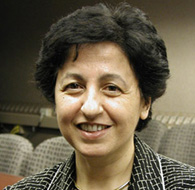Plenary Panel: AI & Security
Plenary Panel: AI & Security
| Title: | AI & Security |
| Date/Time: | Thursday July 11, 10:15 Location: Aula Magna, Universita' degli Studi di Milano |
| Summary: | Artificial Intelligence (AI) emerged as a field of study in Computer Science in the late 1950s. Researchers were interested in designing and developing systems that could behave like humans. This interest resulted in substantial developments in areas such as expert systems, machine learning, planning systems, reasoning systems and robotics. However, it is only recently that these AI systems are being used in practical applications in various fields such as medicine, finance, marketing, defense, and manufacturing. The main reason behind the success of these AI systems is due to the developments in data science and high-performance computing. For example, it is now possible collect, store, manipulate, analyze and retain massive amounts of data and therefore the AI systems are now able to learn patterns from this data and make useful predictions. While AI has been evolving as a field during the past sixty years, the developments in computing systems and data management systems have resulted in serious security and privacy considerations. Various regulations are being proposed to handle big data so that the privacy of the individuals is not violated. For example, even if personally identifiable information is removed from the data, when data is combined with other data, an individual can be identified. Furthermore, the computing systems are being attacked by malware resulting in disastrous consequences. In order words, as progress is being made with technology, the security of these technologies is in serious question due to the malicious attacks. Over the decade. AI and Security are being integrated. For example, machine learning techniques are being applied to solve security problems such as malware analysis, intrusion detection and insider threat detection. However, there is also a major concern that the machine learning techniques themselves could be attacked. Therefore, the machine leading techniques are being adapted to handle adversarial attacks. This area is known as adversarial machine learning. Furthermore, while collecting massive amounts of data causes security and privacy concerns, big data analytics applications in cyber security is exploding. For example, an organization can outsource activities such as identity management, intrusion detection and malware analysis to the cloud. While AI techniques are being applied to solve cyber security problems, the AI systems have to be protected. For example, how can the machine learning systems be protected from the attacks? What are the threats to the planning systems? How can expert system carry out their functions in the midst of malware attacks? What are the appropriate access control models for AI systems? How can we develop appropriate security policies for AI systems? These are questions that researchers are beginning to provide answers to. To assess the developments on the integration of AI and Security over the past decade and to determine future directions, the panel will focus on two major questions: (i) how can the developments in AI techniques be used to solve security problems and (ii) how can we ensure that the AI systems are secure and adapt to adversarial attacks? The panel will first provide an an overview of the security and privacy considerations for AI sytems. Second, it will describe the application of AI including machine learning for cyber security applications such as insider threat detection. Third, it will discuss the trends in areas such as adversarial machine learning that take into consideration the attacker’s behavior in developing machine learning techniques. Fourth, it will discuss some emerging trends in carrying out trustworthy AI so that the AI techniques can be secured against malicious attacks. Fifth, it will focus on the privacy threats due to the collection of massive amounts of data and potential solutions. Finally, it will discuss the integration of services computing including cloud-based services for AI and Security. |
| Chair: |  Bhavani Thuraisingham Bhavani ThuraisinghamDr. Bhavani Thuraisingham is the Louis A. Beecherl, Jr. I Distinguished Professor in the Erik Jonsson School of Engineering and Computer Science at the University of Texas at Dallas (UTD) since September 2010. She joined UTD in October 2004 as a Professor of Computer Science and Director of the Cyber Security Research Center which conducts research in data security and privacy, secure networks, secure languages, secure social media, data mining and semantic web. She is an elected Fellow of three prestigious organizations: the IEEE (Institute for Electrical and Electronics Engineers, 2002), the AAAS (American Association for the Advancement of Science, 2003) and the BCS (British Computer Society, 2005). She is the recipient of numerous awards including the 2010 Research Leadership Award for “Outstanding and Sustained Leadership Contributions to the Field of Intelligence and Security Informatics” presented jointly by the IEEE Intelligent and Transportation Systems Society Technical Committee on Intelligence and Security Informatics in Transportation Systems and the IEEE Systems, Man and Cybernetics Society Technical Committee on Homeland Security, and the 2010 ACM SIGSAC (Association for Computing Machinery, Special Interest Group on Security, Audit and Control) Outstanding Contributions Award for “seminal research contributions and leadership in data and applications security for over 25 years”. She is a Distinguished Scientist of ACM, was an IEEE Distinguished Lecturer between 2002 and 2005, and was also featured by Silicon India magazine as one of the seven leading technology innovators of South Asian origin in the USA in 2002. |
| Chair: |  Elisa Bertino Elisa BertinoElisa Bertino is professor of database systems in the Department of Computer Science and Communication of the University of Milan where she is currently the chair of the Department and the director of the DB&SEC laboratory. She has been a visiting researcher at the IBM Research Laboratory (now Almaden) in San Jose, at the Microelectronics and Computer Technology Corporation, at Rutgers University, at Purdue University, at Telcordia Technologies. She is currently a member of Microsoft Corp. Trustworthy Computing Academic Advisory Board. Her main research interests include security, privacy, database systems, object-oriented technology, multimedia systems. In those areas, Prof. Bertino has published more than 200 papers in all major refereed journals, and in proceedings of international conferences and symposia. She is a co-author of the books “Object-Oriented Database Systems – Concepts and Architectures” 1993 (Addison-Wesley International Publ.), “Indexing Techniques for Advanced Database Systems” 1997 (Kluwer Academic Publishers), and “Intelligent Database Systems” 2001 (Addison-Wesley International Publ.). She is a co-editor in chief of the Very Large Database Systems (VLDB) Journal and a member of the advisory board of the IEEE Transactions on Knowledge and Data Engineering. She serves also on the editorial boards of several scientific journals, including IEEE Internet Computing, ACM Transactions on Information and System Security, Acta Informatica, the Parallel and Distributed Database Journal, the Journal of Computer Security, Data & Knowledge Engineering, and the International Journal of Cooperative Information Systems, Science of Computer Programming. She has been consultant to several Italian companies on data management systems and applications and has given several courses to industries. She is involved in several projects sponsored by the EU. Bertino is a Fellow member of IEEE and a member of ACM and has been named a Golden Core Member for her service to the IEEE Computer Society. She has served as Program Committee members of several international conferences, such as ACM SIGMOD, VLDB, ACM OOPSLA, as Program Co-Chair of the 1998 IEEE International Conference on Data Engineering (ICDE), as program chair of 2000 European Conference on Object-Oriented Programming (ECOOP 2000), and as program chair of the 7th ACM Symposium of Access Control Models and Technologies (SACMAT 2002). She will be serving as program chair of the 2003 EDBT Conference. |
| Panelist: |  Hiroki Takakura Hiroki TakakuraHiroki Takakura is the Director of Cybersecurity Research and Development at the National Institute of Informatics in Japan. He has also supervised NII Security Operation Collaboration Services (NII-SOCS) in order to detect, analyze, identify and pursue cyberattacks against 100 national universities since 2017. With his experience and knowledge on cybersecurity, he contributes to various public agencies, including Ministry of Health, Labor and Welfare, Ministry of Economy, Trade and Industry, National Center of Incident Readiness and Strategy for Cybersecurity. Takakura received his B.S. and M.S degrees from Kyushu University in1990 and 1992 respectively. In 1995, he received Dr. Eng. degree from Kyoto University. After research activities at University of Illinois at Urbana-Champaign (Visiting Scholar), Nara Institute of Science and Technology (Research Associate), Kyoto University (Lecturer and Associate Professor) and Nagoya University (Professor), in 2015 he became a professor at the National Institute of Informatics. In 2016 he became Director of the Center for Cybersecurity Research and Development, NII. |
| Panelist: |  Ernesto Damiani Ernesto DamianiErnesto Damiani is a professor at the Department of Computer Science at Universita’ degli Studi di Milano, where he leads the SEcure Service-oriented Architectures Research (SESAR) Lab. Ernesto is also the Founding Director of the Center for Cyber-Physical Systems at Khalifa University, in the UAE. He received a honorary doctorate from Institut National des Sciences Appliquées de Lyon, France (2017) for his contributions to research and teaching on Big Data analytics. Ernesto is the Principal Investigator of the H2020 TOREADOR project on Big data as a service. His research spans Cyber-security, Big Data and cloud/edge processing, where he has published over 600 peer-reviewed articles and books. He is Distinguished Scientist of ACM and a recipient of the 2017 Stephen Yau Award. |
| Panelist: |  Murat Katarcioglu Murat KatarciogluProf. Dr. Murat Kantarcioglu is a Professor in the Computer Science Department and Director of the Data Security and Privacy Lab at The University of Texas at Dallas (UTD). He received a PhD in Computer Science from Purdue University in 2005 where he received the Purdue CERIAS Diamond Award for Academic excellence. He is also a visiting scholar at Harvard Data Privacy Lab since 2013. Dr. Kantarcioglu’s research focuses on the integration of cyber security, data science and blockchains, creating technologies that can efficiently and securely process and share data. His research has been supported by grants including from NSF, AFOSR, ARO, ONR, NSA, and NIH. He has published over 170 peer reviewed papers in top tier venues such as ACM KDD, SIGMOD, IEEE ICDM, ICDE, PVLDB, NDSS, USENIX Security and several IEEE/ACM Transactions as well as served as program chair for conferences such as ACM SACMAT. Some of his research work has been covered by the media outlets such as the Boston Globe, ABC News , PBS/KERA, DFW Television, and has received multiple best paper awards. He is the recipient of various awards including NSF CAREER award, the AMIA (American Medical Informatics Association) 2014 Homer R Warner Award and the IEEE ISI (Intelligence and Security Informatics) 2017 Technical Achievement Award for his research in data security and privacy. He is also a Distinguished Scientist of ACM. |